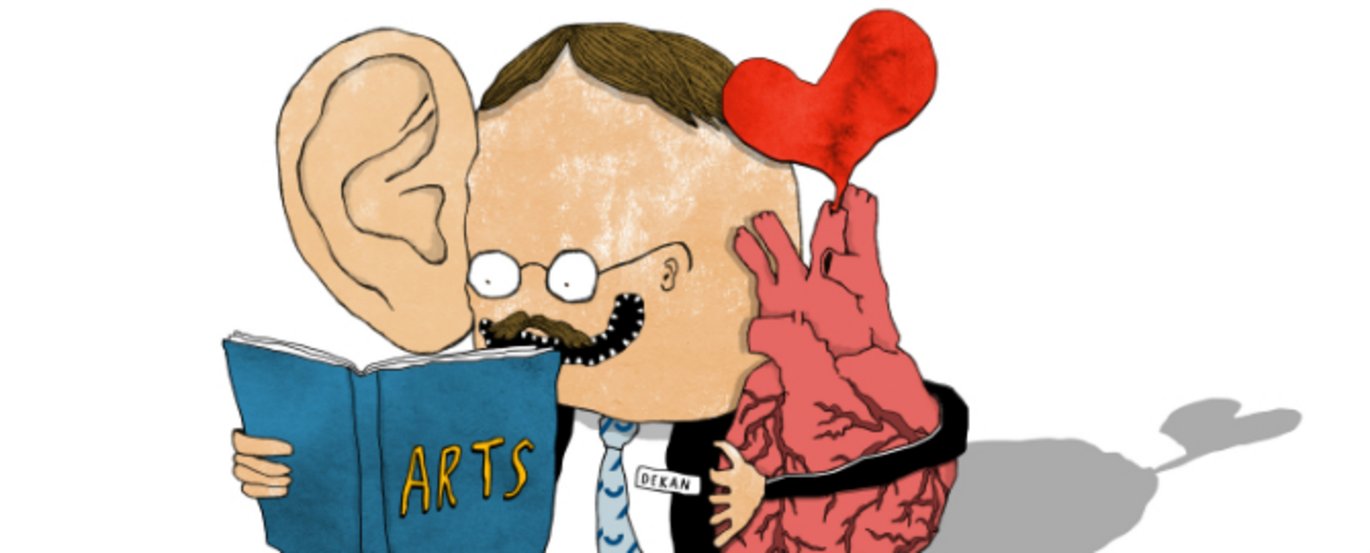Wanted: A strong dean who really understands Arts

By Lieve Vermeulen, seventh semester student of the study of religion and Kirstine Pedersen, eleventh semester student of classical archaeology, on behalf of the ARTScouncil.
The consequences of relocations, restructuring and attempts to standardise the study programmes at Arts in recent years have not gone unnoticed by us students. Lots of students saw their library, study spaces and coffee room packed in removal boxes and moved to new premises. Permanent study spaces were replaced by shared study spaces across the degree programmes and subject libraries by compact shelves. For these reasons, we want a new dean who understands the necessity of rebuilding our physical and psychological study environments.
Because our study environment is more than just a study space. It is the place to study, to explore your subject above and beyond the syllabus, to meet fellow students from your own and other subjects and to feel that you are developing academically. The individual student's well-being does not only depend on the academic environment – the social study environment is also important! The social study environment at the individual study programmes is created by the students themselves. By passionate people who are eager to cultivate academic excellence in a lecture society, by students who choose to get involved in the Friday bar, and by social associations which arrange events like Christmas parties and summer parties that bring both students and teachers closer to each other. At the same time, these active students gain competences in and experience of organisation, project management, communication, etc. from working in the student-run associations. For our study environments to function better, they need the right framework. Here our hope is that the coming dean will remember that funds need to be made available, even in these difficult times, and that he or she will take the necessary time to listen to the needs of the individual, local academic environments. For example, the requirements for what a library should be able to do can vary greatly, depending on whether you ask theology or digital design. It is important to keep in mind that Arts is a faculty with very large differences in many areas and it is important that both large and small subjects have the same opportunity to organise and develop their study environment.
Changes to academic regulations, course descriptions and meetings of the boards of study are topics that can appear to be totally uninteresting for the majority of students. But in our experience is that once you start messing with the students' core disciplines, then the vast majority of students will have an opinion about what you are doing. As a student you have made a conscious choice about what degree you want to do, so how your degree programme is put together is anything but trivial. And especially in times like these with humanities electives and profile courses, core disciplines are on most people’s minds. The past couple of years of attempts at making the study programmes at Arts more uniform has resulted in a de-emphasising of the individual study programme’s core disciplines. A prioritisation that is diametrically opposed to the wishes and needs of the students. It has also become clear that not everything which is decided from the top down can be implemented equally successful everywhere. It is therefore important that the diversity of departments and studies is once again acknowledged, so that the people in the individual academic environments can find the solutions that best match their needs.
We are now keen to see what a new dean of Arts will bring. We are hoping for a strong dean who has an understanding of Arts and knows what Arts is all about. We hope that the coming dean will prioritise the study environment at Arts, including the physical and the psychological, the academic and the social. We hope that inclusion will be a keyword from now on, so that the students, teachers and the administrative staff can exert influence on their everyday lives. A dean who understands the importance of both the small and large academic environments and a dean who can see the possibilities in the many differences that are gathered together at Arts. And a dean who is not afraid of making decisions. But most important of all is a dean that really attaches importance to inclusion, as there is an enormous amount of experience and knowledge in the local academic environments.
Translated by Peter Lambourne.

